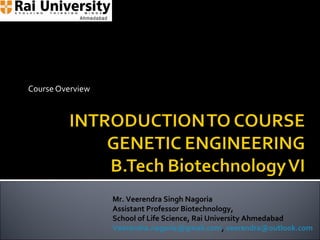Genetic engineering Course Overview
- 1. Course Overview Mr. Veerendra Singh Nagoria Assistant Professor Biotechnology, School of Life Science, Rai University Ahmedabad Veerendra.nagoria@gmail.com, veerendra@outlook.com
- 2. ’éĪ Minimum Attendance requirement to sit for final semester examination is 75% ’éĪ No Assignment after defined time limit ’éĪ Open to discussion on Web over Google group. ’éĪ PPTs can be taken from my ║▌║▌▀Żshare account but it is limited in nature consult books ’éĪ Participation during lecture session will be having additional weightage
- 3. CONTINUOUS EVALUATION 30 Marks Mid-Term Assessment As per examination Assignment 1 10 Marks Viva on Assignment 1 5 Marks Assignment 2 10 Marks Viva on Assignment 2 5 Marks Class Presentation 15 Marks Class Participation 5 Marks END SEMESTER EVALUATION 70 Marks
- 4. ’éĪ Introduction to concepts, Definitions, Discoveries ’éĪ Overview of fundamental processes: Replication, Transcription, Translation ’éĪ Basic Methodology ’éĪ Restriction modification system and Restriction Enzymes ’éĪ DNA modification enzymes: Nucleases, Polymerases, Enzymes modifying the ends of DNA molecule
- 5. ’éĪ Vectors: Plasmids, Bacteriophages, Cosmid, Phagemid, Artificial chromosomes ’éĪ Host cell types- prokaryotic and eukaryotic ’éĪ Transfer of vector into host cell: Transformation, Transfection, Packaging of phage DNA, Alternative DNA delivery methods
- 6. ’éĪ Cloning from mRNA, Genomic DNA ’éĪ Cloning after restriction digestion; blunt and cohesive ’éĪ Creation of cloning site by PCR ’éĪ Cloning using Linkers and Adapters ’éĪ Cloning by recombination; GATEWAY technology ’éĪ TA Cloning, TOPO Cloning, Ligation free cloning
- 7. ’éĪ Screening methods; Chromogenic substance, Insertional inactivation, Complementation of defined mutation ’éĪ Selecting recombinant clones; Reporter gene, elimination of non-transformed cells, identification of clones having Recombinant DNA ’éĪ Sequence Dependent screening; Colony hybridization, Chromosome walking, Screening by PCR, Gene Tagging
- 8. ’éĪ Genetic Engineering & Biotechnology; protein production, protein engineering, scale up ’éĪ Medicinal & Forensic Application of Gene Manipulation; Diagnosis, Treatment and DNA profiling










